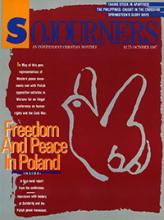JANUSZ ONYSZKIEWICZ works as a professor of mathematics at the University of Warsaw in Poland. He was active in the leadership of Solidarity from the movement's beginnings in 1980. After the declaration of martial law in December 1981, Onyszkiewicz was interned for a year, then released, then rearrested twice. For the past three years, he has served as the designated national spokesperson for Solidarity. He was interviewed in Warsaw by Polly Duncan, associate director of Sojourners Peace Ministry.
--The Editors
Sojourners: Could you discuss Solidarity's situation since martial law ended? What are Solidarity's current achievements, goals, and hopes for the future?
Read the Full Article

Already a subscriber? Login
